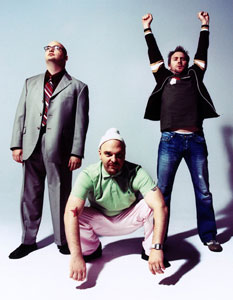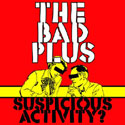Ebert on Doom
Best quote from Roger Ebert’s response to a reader’s defense of ‘Doom’: “I am a believer in the value-added concept of filmmaking…”
Best quote from Roger Ebert’s response to a reader’s defense of ‘Doom’: “I am a believer in the value-added concept of filmmaking…”
I realize my blog has been pretty low on original content and commentary lately, probably due to the continuing effects of working as an attorney and having a six-month-old baby daughter, combined with the difficulty of writing about interesting legal/technological topics without touching on anything I’m actually working on in my job so as to preserve client confidentiality. I have a number of interesting issues to write about, I just haven’t figured out the right way to do it yet.
So, to continue with the “no original content” theme, here’s a great film about the President’s speechalist.
Entirely unrelatedly, I’ll put in a plug for Paris, Texas, the latest occupant of my “current favorite film” slot. I’ve enjoyed all of Wim Wenders films, but this one may take the cake.
Also, while I’m on an atypical blog entry, I’ll be in Chicago around Christmastime. I figured—what better place to take a vacation in the dead of winter than Chicago, where the temperature can stay below 0 for days on end and the wind sometimes blows you into the frozen lake?
A couple of weeks ago, I asked why the Boston mayoral debate video wasn’t available online. It turns out that that the great folks at WGBH, our public television station do have a streaming copy on their website, but it doesn’t show up in a few Google searches. So here it is—the Boston mayoral debate between Tom Menino and Maura Hennigan.
For the past year or two, I’ve kept weblog spam comments at bay with a custom hack that blacklists common spam phrases and URLs. Every month or two, a new spam format seems to evade the filter, and it’s usually easy enough to identify a unique phrase that is unlikely to appear in a legitimate comment and add it to the blacklist. (Most of these unique phrases are not appropriate for general audience consumption—suffice it to say that they often relate to unorthodox sexual activities). If I receive more than three or four spam comments from a particular IP address, I blacklist that IP address from commenting.
This approach has been fairly low maintenance, and while rather crude, has very few false negative and false positive results.
Just recently, however, my friend Jamie reports that he is getting “spam” comments on his blog that actually don’t point to any spam sites. In fact, there’s nothing in the comment or the URLs that is spam, other than the fact that the comments have nothing to do with the blog entry.
This phenomenon is apparently becoming widespread—for example, see this poor guy, who appears to have a totally legitimate blog which is now the “target” of many of these quasi-spam comments.
My guess is that these faux spams are designed to trigger automatic blacklists and thus poison the blacklists with “good” sites and presumably ruin the whole system. It’s not really effective against my technique, which involves manually blacklisting sites, but it is certainly annoying. So far none of these have hit me, but I’m sure it won’t be long.
I’m loathe to implement a captcha or login requirement on my blog—one of the great things about the blogosphere is the low barrier to entry for participation—but that may be the only choice. Any other ideas?

Last Friday, we saw The Bad Plus and Color and Talea at the Somerville Theatre. It was one of the best live shows I’ve seen in a long time. The two groups, while superficially similar in that they are both avant garde jazz/funk influenced bands with similar instrumentation, were fundamentally different in influences and vibe. They were both quite innovative, though, and pushed boundaries in ways that felt really fresh.
The Bad Plus was particularly remarkable live. I’ve been listening to their album, These Are The Vistas, for a long while, but I wasn’t prepared for the dynamicism and almost-falling-off-the-edge feeling of their performance. Rather than the typical “jazz trio” with two musicians performing backup rhythm section while the other one does an improvisational solo, the image that came to mind for me were three jugglers conversing on a party line. They created more combinations of three standard instruments than I thought possible. You don’t really pick up on it in on the album, at least not until after you’ve seen them live.
I’m not sure who best to compare them with; there’s definitely some Keith Jarrett in there, but otherwise, I’m at a loss. Maybe Stravinsky, and Bach or Chopin. Their pieces feel more like “compositions” than most jazz, but somehow that doesn’t undercut the spontaneous feeling of it.

Their new album (the fourth), Suspicious Activities, is even better than the first. They are masters of giving you just enough of a funky groove to get into it, and then sliding into something more free form, and then just when you feel like you’re about to lose your grounding entirely, they’ll slide back into the funk. Here’s a less-than-30-second clip from “Theme from Chariots of Fire” which is a good illustration: ogg format (388k) and mp3 format (697k). (For some reason, they called this “The Theme to Cagney and Lacey” in concert.)
Most of the songs on Suspicious Activities have some accompanying narrative story, which is unusual for an instrumental jazz album. For example, ‘Rhinoceros is My Profession’ is about a bullfight. After the matador slays the bull and is basking in adulation, the gate opens and a rhinoceros comes charging into the ring. Ethan Iverson, the pianist, introduced this story by saying (in a perfectly dry tone of voice), “If there’s one thing we in the Bad Plus all agree on, it’s our mutual disapproval of bullfighting.” Another song, ‘O. G. (Original Gentleman)’ was originally intended to be a tribute to legendary drummer Elvin Jones, but since that was too ambitious a task, it ended up being about the lingering feeling in a donut shop after Elvin Jones has left the place.
They also posted some odd photos of their visit to Somerville on their blog.
Today I received over 100,000 hits like this:
209.88.228.11 - - [04/Oct/2005:16:57:52 -0400] "PROPFIND /error/notfound.html/ HTTP/1.1" 302 240 "-" "Mozilla/5.0 (compatible; Konqueror/3.4; Linux) KHTML/3.4.1 (like Gecko) (Debian package 4:3.4.1-1)"
It looks like the person actually came to my site for a legitimate reason:
209.88.228.11 - - [04/Oct/2005:09:50:41 -0400] "GET /weblog/2005/08/ HTTP/1.1" 200 53323 "http://www.google.com/search?hl=en&ie=UTF-8&q=download+growisofs+5.21+debian&spell=1" "Mozilla/5.0 (compatible; Konqueror/3.4; Linux) KHTML/3.4.1 (like Gecko) (Debian package 4:3.4.1-1)"
and then wanted to see the contents of my /blogimages directory. That directory (where I store images that appear on this blog) cannot be publicly viewed:
209.88.228.11 - - [04/Oct/2005:09:52:19 -0400] "PROPFIND /blogimages/ HTTP/1.1" 302 239 "-" "Mozilla/5.0 (compatible; Konqueror/3.4; Linux) KHTML/3.4.1 (like Gecko) (Debian package 4:3.4.1-1)" 209.88.228.11 - - [04/Oct/2005:09:52:19 -0400] "PROPFIND /error/notfound.html/ HTTP/1.1" 302 239 "-" "Mozilla/5.0 (compatible; Konqueror/3.4; Linux) KHTML/3.4.1 (like Gecko) (Debian package 4:3.4.1-1)"
But why would this failed request repeat more than 100,000 times, basically every second for hours? Is this a very bad konqueror behavior, or a well camouflaged denial-of-service attack, or something else entirely? This kind of thing could generate some bad press for free software unless there’s a good explanation (“Konqueror security hole swamps innocent websites,” etc..).
Apparently, the video of the Boston mayoral debate, which was supposed to be available for “on-demand” viewing from Comcast until the election, was only up for 48 hours after the debate. I don’t understand why it’s not just online—it seems to that political debates are the ideal sort of non-copyright-sensitive content that ought to be freely available on the Internet. The Supreme Court has noted that the Internet is “a vast platform from which the public may address and hear from a worldwide audience of millions.” Reno v. ACLU, 521 U.S. 844, 853 (1997). So why isn’t it working on this local political issue?
If has a link to a video of the debate online, please let me know. If not, if anyone has a videotape of the event, contact me, and I’ll put it up here.